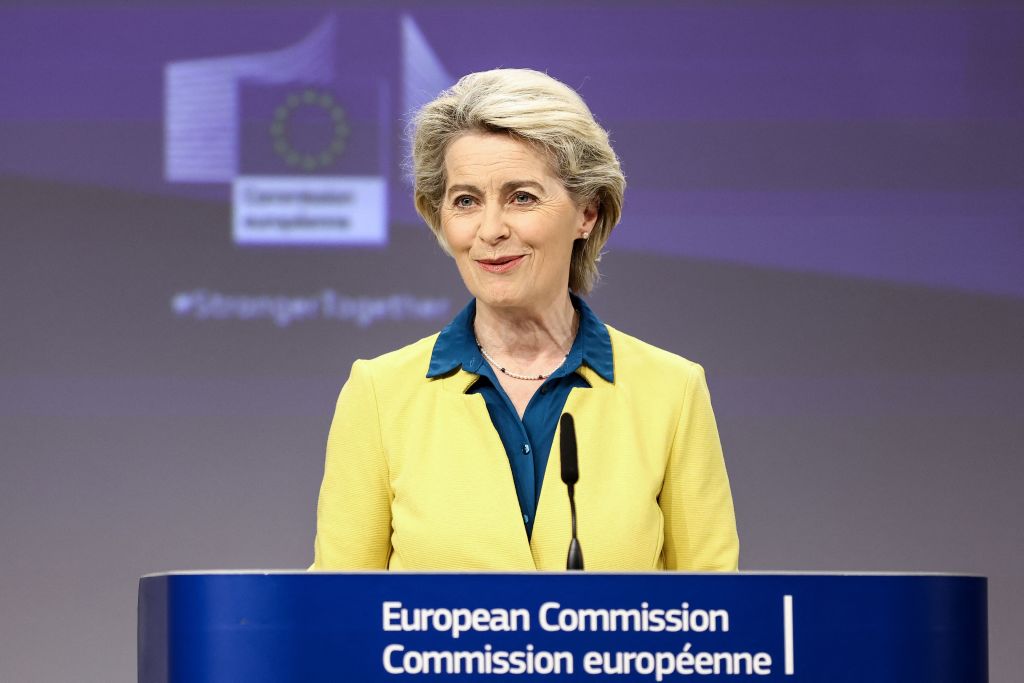
Ukraine’s bid to join the E.U. received a boost Friday after the bloc’s executive arm recommended that the embattled country deserves to become a candidate for membership.
The endorsement by the European Commission (EC) sends a strong signal of solidarity with Ukraine following Russian President Vladimir Putin’s Feb. 24 full-scale invasion of the country. The next step is for the leaders of all 27 E.U. member states to consider the recommendation at a meeting scheduled for June 23-24.
“Ukraine should be welcomed as a candidate country,” EC President Ursula von der Leyen said in a statement on the decision. “This is on the understanding that good work has been done but important work remains to be done. The entire process is merit-based, so it goes by the book and progress depends entirely on Ukraine. So it is Ukraine that has it in its hands.”
Read more: Inside the Mind of the Most Powerful Woman in Europe
The decision comes a day after the leaders of Germany, France, Italy, and Romania became the latest of many global leaders to meet in Kyiv with Ukrainian President Volodymyr Zelensky, who described it as a “truly historic” day. “Tomorrow and the day after tomorrow there will also be a lot of news for Ukraine, and I believe that it will be positive,” he said.
And given that Ukraine’s drift toward Europe and prospective membership of NATO is what kicked off Putin’s aggression, the EC’s decision represents yet another owngoal for the autocrat.
“The thing that Putin really has to worry about is the E.U., rather than NATO,” Robert Hunter, former U.S. Ambassador to NATO, tells TIME. “NATO is never going to attack anybody, but the E.U. creates a standard that makes Russia look stupid. What Putin is really worried about is contagion. Because he saw contagion is what led the Soviet Union to collapse, when they tried to talk about opening up the Soviet economy, and people said, ‘why don’t we discuss something else, like freedom to talk?’”
Still, experts warn the EC’s decision is only a tentative step on a path that could take years to complete. While there is plenty of support for Ukraine within the E.U., the country’s candidacy comes against a backdrop of mounting Euroskepticism.
Expediting E.U. membership would mean Ukraine leapfrogs other candidates, principally Balkan nations, and so the bloc is walking a tightrope between demonstrating solidarity with Kyiv without veering into favoritism. Austrian Chancellor Karl Nehammer is one leader who has said Ukraine shouldn’t have preference over Western Balkans states such as Bosnia-Herzegovina, though he did back an “intermediate” membership for the country.
In Kyiv, German Chancellor Olaf Scholz said the “very demanding” process could take years given that Ukraine needs to make progress on corruption and improving the rule of law. What’s more, ripping up a slow-go approach by hastening Ukraine’s accession risks sowing widespread discord. The 2010 euro-area sovereign debt crisis, the 2015 European migration crisis, and the Brexit referendum a year later boosted the perception that the E.U. would be prudent to expand cautiously. Other than Ukraine, Georgia and Moldova both rushed to apply for E.U. membership in March and accepting all of their memberships risks drastically altering the bloc’s composition. On Friday, the EC approved Georgia and Moldova’s candidate status also.
Read more: Moldova’s Leader Wants to Stay Neutral—But Her Country Could Be Putin’s Next Target
Beginning accession talks requires unanimous approval from all E.U. nations and its common for historic baggage to scupper plans. North Macedonia, for one, gained candidate status in 2005 though its progress has stalled—despite changing its official name from the Republic of Macedonia to appease Greece, which objected given its own province of Macedonia—most recently because Bulgaria threw up a last-minute objection related to language and ethnicity.
Turkey, which has already said it may block recent applications for Finland and Sweden to join NATO, applied for E.U. membership in 1987, though it received candidate status in 1999 and negotiations for entry only began in 2005. However, the process is stalled due to myriad disputes between E.U. member states. “European negotiations with Turkey on membership were always [rubbish], it was never going to happen,” says Hunter. “They strung [Turkish President Recep Tayyip Erdogan] along for a while until the Turks finally got [the message].”
More Must-Reads from TIME
- Why Biden Dropped Out
- Ukraine’s Plan to Survive Trump
- The Rise of a New Kind of Parenting Guru
- The Chaos and Commotion of the RNC in Photos
- Why We All Have a Stake in Twisters’ Success
- 8 Eating Habits That Actually Improve Your Sleep
- Welcome to the Noah Lyles Olympics
- Get Our Paris Olympics Newsletter in Your Inbox
Write to Charlie Campbell at charlie.campbell@time.com